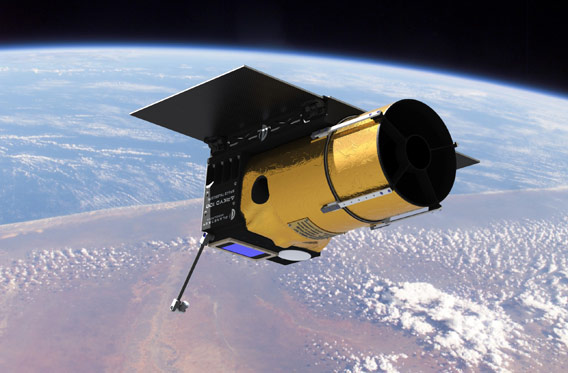Create a free profile to get unlimited access to exclusive videos, sweepstakes, and more!
Asteroid Mining Company Kickstarts a Space Telescope

Planetary Resources, Inc.âthe company that wants to mine asteroidsâhas a new project they've just announced: They're crowdfunding a space telescope.
Yup, you read that right. PRI has a Kickstarter page set up to fund a small (20 cm, or 8â) telescope that will orbit the Earth. It will take pictures of our planet from above, and astronomical objects, too. Different funding levels will give people different access to the telescope. In a clever twist, if you back it at the $25 or above level, you can upload a picture of yourself that will be displayed on a small screen, and the satellite will take a picture of your picture with the Earth as a backdrop. Â
This is one step of PRIâs overall goal to eventually mine asteroids. The companyâs plan is a series of steps leading to that ultimate goal, including launching several small telescopes to observe the Earth and sky, survey the sky to find near-Earth asteroids, create small probes that can visit and study asteroids, and eventually mine them for useful materials. I have a detailed description of their plans from when they first announced them in 2012.
This crowdfunded space telescope, called ARKYD, is a way for them to test out their abilities to launch and use such a satellite. PRI has already invested quite a bit of money into the development of a series of telescopesâmostly to look for asteroids, but this new one has different goals and therefore a different design. While they are still putting their own money into designing and building it, the Kickstarter is a way to get people involved personally. It has a series of astronomical filters on it (for the nerds out there: UV (< 300 nm), B, V, R, [OIII], Hα, 1 μm, and a clear (luminence) filter) which means you can create near-true-color pictures, too. Itâs not a huge telescope, and you donât get vast amounts of time, but it should be fine to get nice shots of bright nebulae and galaxies.
PRI President and Chief Engineer Chris Lewicki explains it in this video:
My personal opinion is that this is a legit effort, and should work pretty well. I like the idea of people using it to observe objects they wantâgetting something like this in the hands of kids in classrooms will do a huge amount positive outreach. You can donate your time to scientists or classrooms, too.
Iâll be curious to see if some of the claims pan out; for example, they talk about finding asteroids with ARKYD, but given the size and filter choice itâs not optimized for it. The âscope should find quite a few rocks, but discovering new ones is a tough game these days. It generally takes big telescopes with lots of time to find previously undiscovered asteroids; most are very faint. But it could find a few, which is enough for PRIâs initial purposes.
The other claims look solid enough. Given the small size and low mass, launching ARKYD isnât all that expensive, and the running costs can be covered if they get enough money pledged. A million dollars is doable via Kickstarter; as I write this they already have more than $40,000 pledged before the official announcement was even made public (the Kickstarter page went live a bit early to test it out). I know my geeks, and I suspect PRI will meet their goal pretty quickly.
Bottom line: I think this is a good idea, it can work, and if it does itâll be a great way to get the public excited about space exploration and discovery. The team is solid (I saw a few old friends in the video, and the engineering team is made of lots of ex-NASA folks who have tremendous experience in robotic planetary and space exploration), and the goal is reachable.
I might kick some money their way myself. I know a few cosmic objects I wouldnât mind observing, and itâs a fun idea. They donât list a launch date, since thatâs difficult to determine so far in advance. But stay tuned; when I find out more Iâll let you know!


























